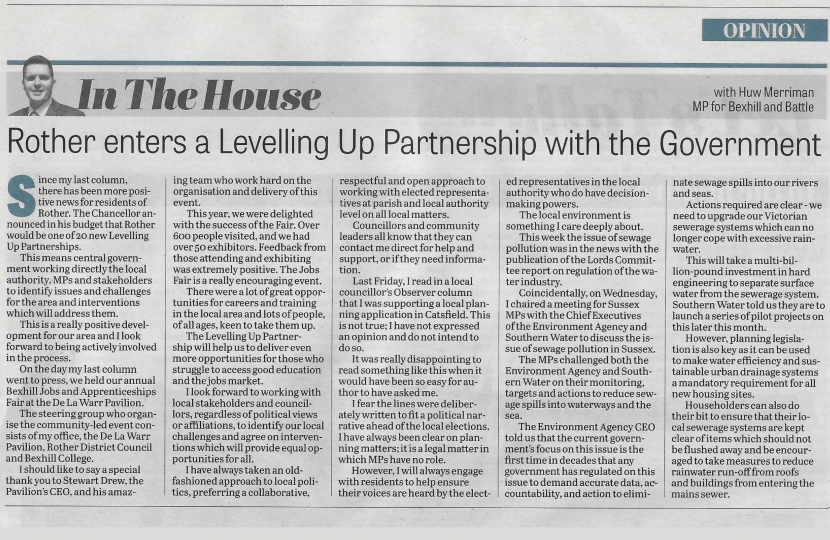
Since my last column, there has been more positive news for residents of Rother. The Chancellor announced in his budget that Rother would be one of 20 new Levelling Up Partnerships. This means central government working directly the local authority, MPs and stakeholders to identify issues and challenges for the area and interventions which will address them. This is a really positive development for our area and I look forward to being actively involved in the process.
On the day my last column went to press, we held our annual Bexhill Jobs and Apprenticeships Fair at the De La Warr Pavilion. The steering group who organise the community-led event consists of my office, the De La Warr Pavilion, Rother District Council and Bexhill College. I should like to say a special thank you to Stewart Drew, the Pavilion’s CEO, and his amazing team who work hard on the organisation and delivery of this event. This year, we were delighted with the success of the Fair. Over 600 people visited, and we had over 50 exhibitors. Feedback from those attending and exhibiting was extremely positive. The Jobs Fair is a really encouraging event. There were a lot of great opportunities for careers and training in the local area and lots of people, of all ages, keen to take them up.
The Levelling Up Partnership will help us to deliver even more opportunities for those who struggle to access good education and the jobs market. I look forward to working with local stakeholders and councillors, regardless of political views or affiliations, to identify our local challenges and agree on interventions which will provide equal opportunities for all. I have always taken an old-fashioned approach to local politics, preferring a collaborative, respectful and open approach to working with elected representatives at parish and local authority level on all local matters. Councillors and community leaders all know that they can contact me direct for help and support, or if they need information. Last Friday, I read in a local councillor’s Observer column that I was supporting a local planning application in Catsfield. This is not true; I have not expressed an opinion and do not intend to do so. It was really disappointing to read something like this when it would have been so easy for author to have asked me. I fear the lines were deliberately written to fit a political narrative ahead of the local elections. I have always been clear on planning matters; it is a legal matter in which MPs have no role. However, I will always engage with residents to help ensure their voices are heard by the elected representatives in the local authority who do have decision-making powers.
The local environment is something I care deeply about. This week the issue of sewage pollution was in the news with the publication of the Lords Committee report on regulation of the water industry. Coincidentally, on Wednesday, I chaired a meeting for Sussex MPs with the Chief Executives of the Environment Agency and Southern Water to discuss the issue of sewage pollution in Sussex. The MPs challenged both the Environment Agency and Southern Water on their monitoring, targets and actions to reduce sewage spills into waterways and the sea. The Environment Agency CEO told us that the current government’s focus on this issue is the first time in decades that any government has regulated on this issue to demand accurate data, accountability, and action to eliminate sewage spills into our rivers and seas. Actions required are clear - we need to upgrade our Victorian sewerage systems which can no longer cope with excessive rainwater. This will take a multi-billion-pound investment in hard engineering to separate surface water from the sewerage system. Southern Water told us they are to launch a series of pilot projects on this later this month. However, planning legislation is also key as it can be used to make water efficiency and sustainable urban drainage systems a mandatory requirement for all new housing sites. Householders can also do their bit to ensure that their local sewerage systems are kept clear of items which should not be flushed away and be encouraged to take measures to reduce rainwater run-off from roofs and buildings from entering the mains sewer.



